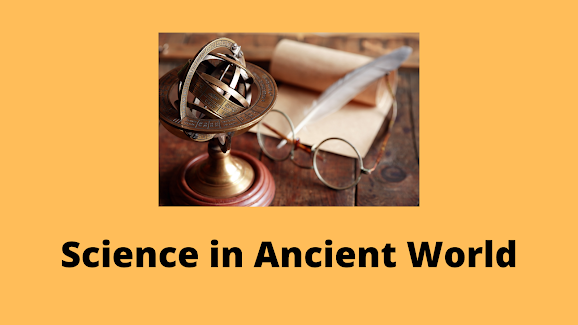In this article we will gonna discuss something important and interesting that is related to our history some way or the other. Science is eternal it is/was there since time started behind everything science is there behind every action there is science behind it. Be tight and lets start the journey. Science in Ancient World
People Usually think that people in older times were technologically and mannerly inferior than us that was not definitely the case for the whole world few civilizations were very advance in almost every field. Like Mathematics, Astrophysics, Astrology, Chemistry, etc etc... Scientists have found many ancient machines and mechanism which extremely complex also many structures that are impossible to make even today without any advance technology then question arises how did they made so difficult things many years ago? There is only one answer to this that they may have putted a lot of efforts on making such instruments and buildings
History of early civilized science(Astronomy)
Astronomy is a science dedicated to recording and studying observations: the strongest observations of the movement of stars, planets, and the moon are left on the thousands of clay tablets created by writers. Even today, astronomical times described by Mesopotamian scientists are still widely used in the Western calendar: the year of the sun, the moon, the week of seven days. Using this data, they performed mathematical calculations that changed the length of the day during the year and predicted the appearance and disappearance of the Moon and planets and the eclipse of the Sun and the Moon. Only a few names are known, such as kaidinnu, a Chaldean astronomer and mathematician who lived during the time of the Greek astronomers. Indeed, instead of following the modern rationale of rational science, turning away from superstition and superstition, Mesopotamian astronomy on the contrary focused more on astrology later in civilization - studying astrology in astrology and astrology, which may explain astronomy. clay tablets. Indus Valley Civilization(Indians) were very ahead in all the fields in Ancient times.How does this matter?
The universe, however, was beyond the reach of those who preceded it in their knowledge of the human body. Pre-Greek medicine was virtually complete in religion and practice. Disease was viewed as the result of divine disapproval and human sin, which had to be dealt with through spells, prayers, and other means of atonement. The 5th century BCE saw a turning point in the history of Hippocrates' name. Even epileptic seizures, which seemed to be caused by God, were thought to be caused by natural causes.
The rise of ancient medical science was reached toward the end of the Greek era. Much work has been done on the Alexandrian museum, a research center founded under Greek influence in Egypt in the 3rd century BCE to support literacy. The cardiovascular system was examined, as were the nerves and brain. The organs of the thoracic cavity were described, and efforts were made to locate their functions. It was in this study, despite the classification of monkeys and pigs, that the last great ancient physician, Galen of Pergamum, supported his physiology. In fact, it was a three-dimensional system in which so-called spirits — natural, vital, and animal — passed through a series of veins, arteries, and veins for the whole body to live. Galen's attempts to link therapies to his physiology were unsuccessful, so the treatment remained relatively rare and was a matter of personal choice. Often the best choice was what the Hippocratics said, who relied heavily on a simple, clean life and physical fitness.
Hope you liked this article comment down below your thoughts on this topic, thanks

